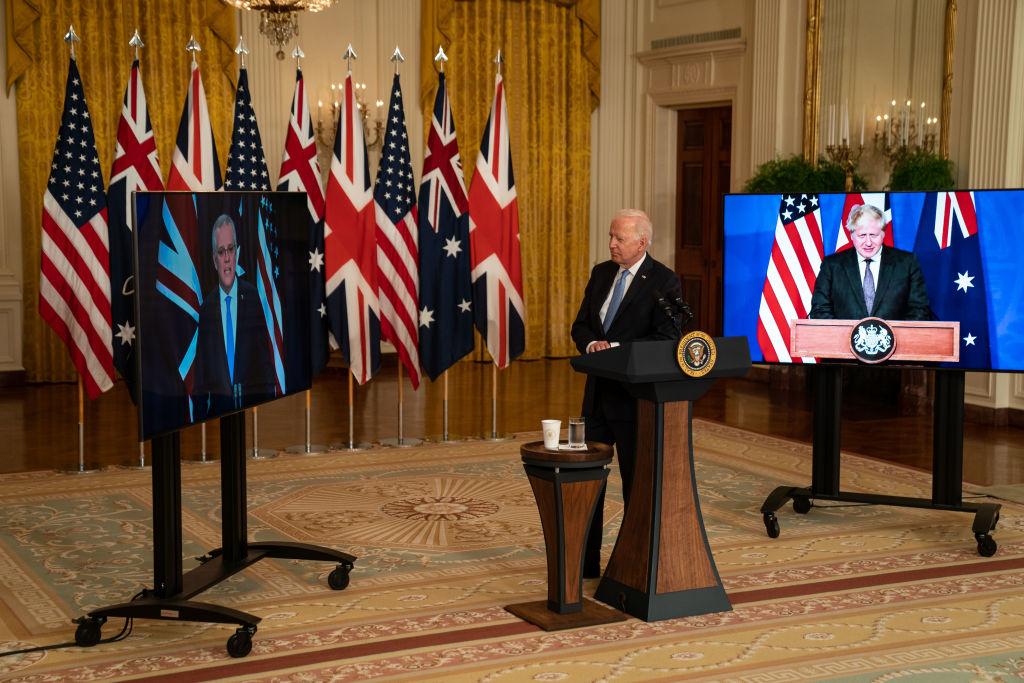How Australian AI will benefit from AUKUS
Posted By Huon Curtis on October 19, 2021 @ 12:46

Prime Minister Scott Morrison has added science and technology to the portfolio [1]of the defence industry minister, Melissa Price, signalling closer alignment of the research sector with the defence organisation.
As that’s been done in the context of the new AUKUS partnership, it’s worth noting the United States and British governments’ sharp focus on the defence and national security implications of artificial intelligence. A review [2] of defence innovation in Australia may reveal a need to strengthen policy areas in which we have lagged behind, in particular our lack of strategic direction [3]with a national AI strategy.
The media coverage of the AUKUS pact has mostly focused on the nuclear-powered submarine announcement, but the agreement also emphasises the importance of AI to defence and national security. Australia’s innovation ecosystem will need to take on board developments in the US and the UK.
Britain’s new AI strategy [4] puts defence front and centre after a 2017 industrial strategy and a £1 billion AI sector deal [5] in 2018. By the end of this year, the UK Ministry of Defence intends to publish its own strategy on how it will adopt and use AI. Over the longer term, the National Security and Investment Act will protect national security and monitor investments in AI technology.
In the US, the necessity for speed has been articulated by the National Security Commission on Artificial Intelligence [6], which was tasked with accelerating the adoption of AI for national security. ‘By 2025, the Department of Defense and the Intelligence Community must be AI-ready,’ it says. This represents a new paradigm in which AI and national security go hand in hand.
Overseen by former Google CEO Eric Schmidt, the AI commission is championing partnerships between technology firms and the Defense Department. A cynic may say that this is to avert the gaze of Congress from antitrust questions in the tech sector, but it is more a sign that technology is increasingly seen as geopolitical [7].
Elements of the linking of AI and national security most important for Australia are the US treatment of its research enterprise as a national asset, and how the maturation of AI—and its monopolisation by a smaller number of firms—is affecting investment.
Former chief defence scientist Robert Clark and ASPI executive director Peter Jennings have pointed out [8] that US universities are being redefined as an important part of the national security enterprise, making them subject to stronger regulation and oversight. They noted that ‘the current largely open approach of Australian research universities to their international links is significantly exposed’.
If the US positioning of research as a national asset is anything to go by, Australian universities are likely to be repositioned as an element of critical infrastructure. Australian AI research ranks highly in terms of per capita output and quality, in particular the frequency with which research papers are cited. But we have a weak venture capital system and longstanding issues in commercialising our research.
Although there are credible calls to have a wholesale redesign of science and technology research along the lines of the US Defence Advanced Research Projects Agency, or DARPA, some trends will affect these solutions, particularly the sector’s maturation and its monopolisation by fewer firms. How we forge partnerships with international tech firms while we develop our own sector is increasingly important.
The shrinking number of firms involved in AI presents national security risks and compounds problems in defence acquisition, where procurement risk is spread by having diverse suppliers.
Fewer firms possess the human capital and brute computer-processing power [9] to handle the data-processing requirements of AI projects. Graduates are increasingly taking jobs with industry rather than with public research institutions. Investors are putting their money into established companies or, as the OECD put it [10], making ‘bigger bets on a smaller number of companies as the AI sector matures’.
While technology seems to be getting bigger and to require an endless flood of private and public cash to take it to the stratosphere, it’s clear that the need for speed in defence acquisition is increasing.
In the US, subtle changes are happening in defence innovation to make processes faster and to navigate the procurement labyrinth.
The US Air Force started its own venture capital division, AFVentures, as a division of its technology and acquisition and development group, AFWerx. It has funded an Australia-based AI company, Curious Things [11], which is trying to redesign the USAF recruitment process. With the Australian defence innovation system under review, it will be interesting to see how these big and small challenges will be incorporated.
As we race towards having an AI edge, there hasn’t been a mature conversation about what the next wave of convergent technology looks like and who should benefit.
The new paradigm of AI and national security will bring out all sorts of arguments that the next wave involves smart dust, photon programming, biotech–AI interfaces, lethal autonomy and the multiverse. But it’s more important to locate Australia’s strategic vision alongside the areas of interoperability and cooperation that are emerging with the US and UK.
Article printed from The Strategist: https://aspistrategist.ru
URL to article: /how-australian-ai-will-benefit-from-aukus/
URLs in this post:
[1] to the portfolio : https://www.zdnet.com/article/australias-defence-minister-melissa-price-adds-science-and-tech-to-portfolio-remit/
[2] review: https://www.defenceconnect.com.au/key-enablers/8734-new-review-to-scrutinise-defence-innovation-strategy
[3] our lack of strategic direction : /australias-strategic-future-hinges-on-investment-in-ai/
[4] new AI strategy: https://www.gov.uk/government/publications/national-ai-strategy/national-ai-strategy-html-version
[5] AI sector deal: https://www.gov.uk/government/publications/artificial-intelligence-sector-deal/ai-sector-deal#further-information
[6] National Security Commission on Artificial Intelligence: https://www.nscai.gov/wp-content/uploads/2021/03/Full-Report-Digital-1.pdf
[7] increasingly seen as geopolitical: /the-geopolitics-of-artificial-intelligence/
[8] pointed out: https://www.aspistrategist.ru/report/australian-darpa-turbocharge-universities-national-security-research-securely-managed
[9] the human capital and brute computer-processing power: /finding-australias-asymmetric-advantage-in-big-data/
[10] as the OECD put it: https://www.oecd.org/digital/venture-capital-investments-in-artificial-intelligence-f97beae7-en.htm
[11] an Australia-based AI company, Curious Things: https://www.austrade.gov.au/landingpads/news/case-studies/sydney-ai-startup-launches-hr-tech-services-in-silicon-valley
Click here to print.